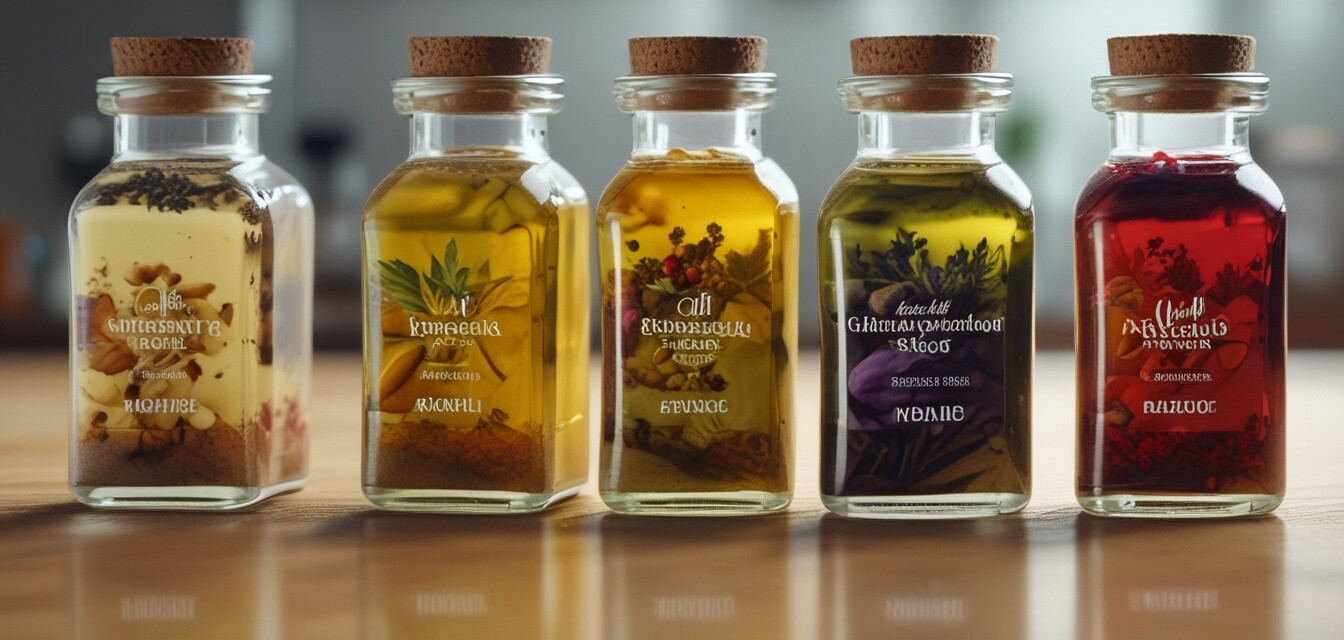
Secrets to Cooking with Infused Oils
Key Takeaways
- Infused oils enhance the flavor of dishes.
- They can be made with various herbs, spices, and even citrus.
- Understanding how to use infused oils can elevate your cooking.
- Homemade infused oils are easy to prepare and customize.
- Different cooking techniques benefit from various infused oils.
Infused oils are not just beautiful to behold; they are also a fantastic way to add complexity and depth to various dishes. From hearty pasta to fresh salads, infused oils can be utilized in countless ways to elevate your culinary creations.
What are infused oils?
Infused oils are oils that have been enhanced with the flavor of herbs, spices, fruits, and other ingredients. The process typically involves gently heating base oil with your choice of flavorings to extract their essence. This infusion transforms ordinary cooking oils into flavor powerhouses.
How to make infused oils
Making your own infused oils at home is easy and allows you to tailor flavors to your liking. Here’s a simple step-by-step guide:
- Choose your base oil: Common choices include olive oil, grapeseed oil, or avocado oil.
- Select your flavorings: Fresh herbs (like basil or rosemary), dried spices, or even citrus peels can be used.
- Heat the oil: Gently heat the oil in a saucepan over low heat.
- Add flavorings: Add your chosen flavorings and let them simmer for about 30 minutes.
- Strain:** Pour the oil through a fine sieve or cheesecloth into a clean, dry bottle to remove solids.
- Store: Keep it in a cool, dark place for up to one month.
Popular flavor combinations for infused oils
| Infusion | Flavor Profile | Uses |
|---|---|---|
| Basil & Garlic | Herbaceous and aromatic | Great for pasta dishes and drizzling over veggies. |
| Chili Pepper | Spicy and bold | Perfect for marinades and adding heat to sauces. |
| Rosemary & Lemon | Fresh and zesty | Wonderful for roasted meats and potatoes. |
| Thyme & Black Pepper | Earthy and peppery | Excellent in salad dressings and dipping oils. |
Using infused oils in cooking
Understanding the correct application of infused oils is key to maximizing their flavor potential. Here are some practical tips on how to incorporate them into your cooking:
- Drizzling: Use infused oils as a finishing touch over pasta, grilled vegetables, or even popcorn.
- Dressings: Incorporate infused oils into homemade salad dressings for an added flavor boost.
- Marinades: Add infused oils to your marinades to enhance the flavor of meats and tofu.
- Baking: Explore using infused oils in baked goods for a unique flavor twist.
- Cooking techniques: Consider using infused oils for sautéing or frying to impart additional flavors to your dish.
Storage and safety tips
Once you've made your infused oils, it's essential to store them properly to maintain freshness and safety. Here are some important tips:
- Always use clean, dry bottles to prevent contamination.
- Store in a cool, dark place away from heat and sunlight.
- Label your infused oils with the date of preparation.
- Use infused oils within one month to enjoy their full flavor and ensure safety.
Experimenting with infused oils
Don't be afraid to try out different combinations and create your unique infused oils. The possibilities are endless! Consider exploring unique ingredients, such as:
- Smoke chips: Add a smoky flavor to your oils.
- Fruit peels: Enhance sweetness and brightness in sweet dishes.
- Spices: Experiment with exotic spices like saffron or cardamom for unique flavor dimensions.
Conclusion
Infused oils not only enhance the taste of your cooking but also provide an avenue for creativity in the kitchen. With their versatility and ease of preparation, there's no reason not to experiment with infused oils. Whether you're drizzling them over a dish or using them in a marinade, the unique flavors of infused oils will undoubtedly elevate your meals.
Pros
- Enhances the flavor profile of dishes.
- Easy and quick to make.
- Customizable to personal preferences.
- Can be used in various cooking techniques.
Cons
- May require careful storage to prevent spoilage.
- Not all flavor combinations may work well.
For more cooking tips and techniques, be sure to check out our Cooking Tips & Techniques section. Explore other baking essentials, cookware sets, and discover valuable cooking buying guides to enhance your culinary journey!